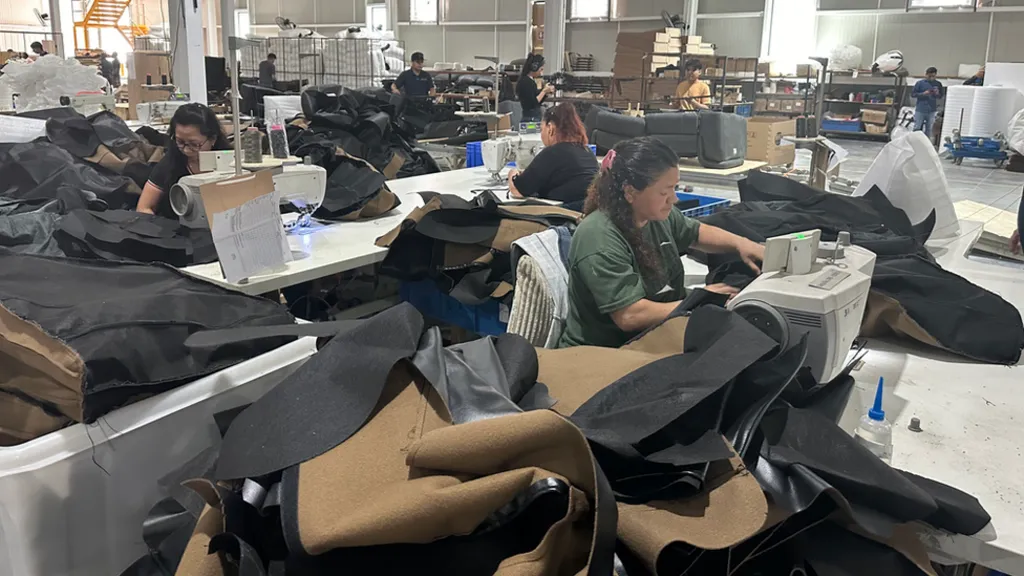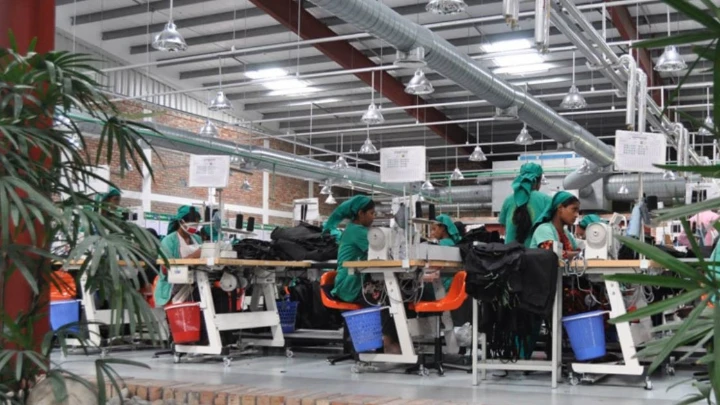How Chinese firms are using Mexico as a backdoor to the US
BBC || Shining BD
The reclining armchairs and plush leather sofas coming off the production line at Man Wah Furniture's factory in Monterrey are 100% "Made in Mexico".
They're destined for large retailers in the US, like Costco and Walmart. But the company is from China, its Mexican manufacturing plant built with Chinese capital.
The triangular relationship between the US, China and Mexico is behind the buzzword in Mexican business: nearshoring.
Man Wah is one of scores of Chinese companies to relocate to industrial parks in northern Mexico in recent years, to bring production closer to the US market. As well as saving on shipping, their final product is considered completely Mexican - meaning Chinese firms can avoid the US tariffs and sanctions imposed on Chinese goods amid the continuing trade war between the two countries.
As the company's general manager, Yu Ken Wei, shows me around its vast site, he says the move to Mexico has made economic and logistical sense.
"We hope to triple or even quadruple production here," he says in perfect Spanish. "The intention here in Mexico is to bring production up to the level of our operation in Vietnam."
The firm only arrived in the city of Monterrey in 2022, but already employs 450 people in Mexico. Yu Ken Wei says they hope to grow to more than 1,200 employees, operating several new lines at the plant in the coming years.
"People here in Mexico are very hardworking and fast learners," says Mr Yu. "We've got good operators, and their productivity is high. So, on the labour side, I think Mexico is strategically very good too."
Certainly, nearshoring is considered to be providing an important shot in the arm to the Mexican economy - by June of last year, Mexico's total exports had risen 5.8% from a year earlier to $52.9bn (£42.4bn).
The trend is showing few signs of slowing down. In just two months of this year, there were announcements of capital investment in Mexico of almost half of the annual total back in 2020.
The Man Wah sofa factory is located inside Hofusan, a Chinese-Mexican industrial park. Demand for its plots is sky high: every available space has been sold.
In fact, the Industrial Parks Association of Mexico say every site due to be built in the country by 2027 has already been bought up. Little wonder many Mexican economists say China's interest in the country is no passing fad.
"The structural reasons that are bringing capital to Mexico are here to stay," says Juan Carlos Baker Pineda, Mexico's former vice-minister for external trade. "I have no indication that the trade war between China and the US is going to diminish any time soon."
Mr Baker Pineda was part of Mexico's negotiating team for the new North American free trade agreement, USMCA.
"While the Chinese origin of the capital coming into Mexico may be uncomfortable for the policies of some countries," he says, "according to international trade legislation, those products are, to all intents and purposes, Mexican".
That has given Mexico an obvious strategic foothold between the two superpowers: Mexico recently replaced China as the US's main trading partner, a significant and symbolic change.

Mexico's increased trade with the US has also come about in part through a second key aspect of nearshoring in the country: US firms setting up Mexican facilities too, sometimes after relocating production from factories in Asia.
Perhaps the standout announcement came from Elon Musk last year, when he unveiled plans for a new Tesla Gigafactory outside Monterrey. However, the electric car company is yet to break ground on the $10bn plant.
And, while Tesla is apparently still committed to the project, it has slowed its plans amid concerns over the global economy, and recent job cuts at the carmaker.
But regarding Chinese investment, some urge caution over Mexico being drawn into the wider geopolitical struggle between the US and China.
"The old rich guy in town, the US, is having problems with the new rich guy in town, China," says Enrique Dussel of the Centre for China-Mexico Studies at the National Autonomous University in Mexico. "And Mexico - under previous administrations, and in this one - doesn't have a strategy vis-à-vis this new triangular relationship."
With elections looming on both sides of the US-Mexico border, there may be new political considerations ahead. But whether it's Donald Trump or Joe Biden in the White House over the next four years, few expect any improvement in US-China relations.
Mr Dussel thinks nearshoring is better defined by what he calls "security-shoring", saying Washington has placed national security concerns above all other factors in its relationship with China. Mexico, he argues, must be wary of being caught in the middle.
Amid this tension, Mr Dussel says: "Mexico is putting up a big sign to China saying: 'Welcome to Mexico!'. You don't need a PhD to know that this isn't going to end well for bilateral relations between the US and Mexico in the medium term," he adds.
Others are more optimistic. "In my mind, the question is not if this trend will continue, but rather how much of this trend can we take advantage of," says former Mexican trade official, Juan Carlos Baker Pineda.
"I'm sure people are having these same discussions in Colombia, in Vietnam, in Costa Rica. So, we need to make sure in Mexico that those conditions that are aligned by themselves go hand-in-hand with corporate and government decisions to sustain that trend in the long term."
Back in Monterrey, the talented Mexican seamstresses at Man Wah Furniture put the finishing touches to another sofa before it's shipped north.
When an American family buys it at a Walmart store near them, they may have little idea of the complex geopolitics underpinning its production.
But whether nearshoring is a clever back door to the US, or part of a costly war between superpowers, it's currently Mexico's key advantage in these hostile times of global trade.
Shining BD























